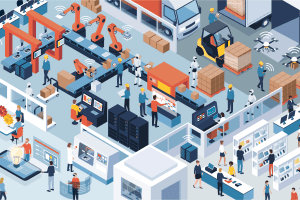In a time of crisis, these four digital disruption mistakes may cost you dearly

Gary Harrold, CEO UK & Ireland, Swiss Post Solutions, details the four digital disruption mistakes companies may be making during difficult times.
What does disruption mean to you? In the pre-pandemic days of 2019, disruption was the dream; in business it was a byword for innovation, transformation, dreaming big.
A global pandemic later and ‘disruption’ has lost its sheen as we’ve attempted to mitigate the disruptive elements of lockdown to stay afloat in a tide of challenges. Digital remedies have been front and centre in our responses and there is no going back.
However, with any period of change and transformation, mistakes will be made. In the year since the pandemic broke, the mistakes organisations are still making are becoming ever clearer. Our idea of digital disruption needs a reset. If we don’t, the next crisis (in whatever form that takes) will put us right back where we were – scrambling for continuity and resilience.
Based on our research, on our conversations with businesses and in the solutions we’ve implemented for our partners throughout this crisis here’s what we’ve learned…
1 – Getting distracted by technology
There’s no doubt that technologies can help solve the most challenging of business needs. When a global crisis hits, it may seem entirely reasonable to respond with rapid deployment of technological solutions. But what if you’re inadvertently storing up a whole load of other problems for the not-so-distant future?

The paperless office is a classic example of the wrong business issue taking precedent. The scenario is this. You rely on a whole raft of paper documents – forms, customer communications, reports etc to keep business processes running. What happens when you can’t access those paper documents? Potentially, disaster.
Surely, a prudent response is to eliminate paper from processes?
But the problem isn’t paper. It’s data. It’s about moving away from documents to understanding the value of the data they hold. It’s about how to get to the data you need in the most efficient way, how to safely share it, how to enable it to do more. Whether paper or some other form, data is the issue. Removing paper from your processes in order may actually store up far worse issues for customers and colleagues that only become obvious once it’s ‘too late’.
In fact, rather than do away with paper, many businesses are upgrading long-forgotten mailrooms into data processing hubs; in recent research from NelsonHall 80% of organisations they surveyed were to digitise mailrooms, with over 70% seeking to digitalise document processes.
The lesson? Technology is just a tool that helps deliver a data-led transformation strategy.
It should never drive it. Instead, strategy should focus on maximising data; how it’s used, the
journey it takes through an organisation, the hurdles it has to jump, the compliance or security
requirements it has to meet – and the crisis’ it has to survive.
2 – Believing in borders that no longer exist
At the start of lockdown we can assume that a raft of organisations brushed the dust off business-continuity plans and realised that they were entirely unfit for the purpose of this pandemic. Despite operating within a global economy, hit by global crisis; what was painfully clear at the start of lockdown is that localised thinking still reigned.
These well-intentioned business continuity plans were often centre and city specific rather than enterprise-wide. In other words, there was an assumption that there would never be a need to close multiple offices and worksites. If one office had to go offline, its sister sites would pick up the slack. That’s no good for scenarios where your sister, brother and second-cousin sites are also forced to close doors.
In revisiting crisis-ready digital transformation strategies, we must take a view of digital transformation that is location-agnostic. And where does this start? Always with data – set data free from the binds of centralised workflows and the rest can follow.
3 – Accepting ‘good enough’ from partners
‘To build greater resilience, enterprises must open themselves to more digitally led partnerships’. That’s the verdict handed down by Accenture on how organisations will build back better. As McKinsey says, the outsourcing industry has been an “integral partner in companies’ crisis response across sectors”.
In the months following lockdown, satisfaction with outsourcing partners was just 38%. A third viewed the readiness of outsourcing partners to respond to crises as ‘low’. You were looking to
partners to help you weather the storm. It’s clear that some were more focused on putting on their own lifejacket than helping you find yours.
Now is a good time to assess your relationships with partners and consider how they handled the immediate aftermath of the crisis. What should you expect as part of a crisis-ready digital partnership?
- Make business continuity planning alongside providers your priority; consider flexibility, location and geographical limitations
- Make sure to investigate and leverage the expertise of partners as back-up resource, they can bring experience and knowledge from a wider perspective
- Ensure access to easily monitored and updated crisis dashboards across outsourced services that ensure service levels are being met
As Deloitte states in its report ‘COVID-19: A wake up call for the BPO industry, ‘the ‘DNA’ of the outsourcing model needs to become more flexible and responsive’.
Seek partners that are born of this DNA, not those that have yet to mutate to fit the new normal.
4 – Turning your nose up at quick fixes
We’ve said that it’s a mistake to act too rashly on immediately obvious issues – but that doesn’t mean that quick fixes are off the cards. Sometimes you have to act. According to Accenture’s Technology Vision 2021 many enterprises are compressing a decade of digital transformation into just one or two years. 92% report their organisation is innovating with “an urgency and call to action” .
Here, we’re not talking about ‘quick and dirty’ fixes that will need to be dismantled as soon as we return to ‘business as normal’ (whatever shape that takes). We are talking about taking a strategic decision to act fast to implement proven strategies that will deliver organisational resilience and business continuity right now.
In recent months, Zurich UK & Ireland implemented a two-year digitisation programme in just two weeks. Other stories of two-year or even five-year plans being achieved in mere weeks are proving that where there is a will, there’s a way.
Accenture echoes this approach in its Trends Vision 2021 report; ‘If businesses continue to have a clear-eyed perspective and sharp focus on their expedited digital transformations, reimagining everything from their people, to data, architectures, and ecosystems, they can emerge as leaders’
Simply put, we no longer have the luxury of time. Right now, quick wins count. In fact, they are now a prerequisite for digital success.
